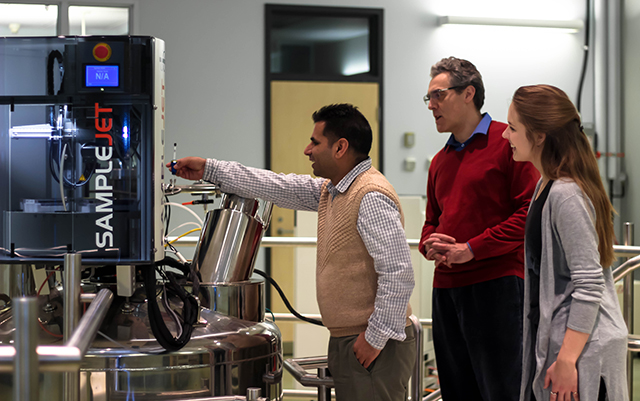
A new robot called Sample Jet has been installed at the University of Alberta. Michael Overduin, Executive Director of the National High Field Nuclear Magnetic Resonance Centre (NANUC) where the robot is housed, and trainees check out the new equipment.
A new robot has just been installed at the University of Alberta. Called a "Sample Jet," the sampling robot is the first system of this kind in Canada. It enables researchers to discover disease mechanisms and design new therapeutic agents by screening the interactions of thousands of drug-like molecules with the greatest sensitivity, resolution and speed.
Michael Overduin, Executive Director of the National High Field Nuclear Magnetic Resonance Centre (NANUC) where the robot is housed, says the new equipment will push the frontier of structural biology research, allowing scientists to focus on the molecular causes of cancer, heart and neurodegenerative or infectious diseases for which there is a critical need for new treatment and drug leads.
The equipment was funded by a $2 million investment from the Canada Foundation for Innovation and the Alberta Ministry of Economic Development and Trade, and is also supported by a collaboration with Bruker, an industry leader in the field of magnetic resonance spectroscopy.
"The Sample Jet has revitalized our national facility," says Overduin. "This technology will allow us to tackle new disease targets, including an enzyme that causes triple negative breast cancer. We're part of a global consortium that has just been awarded $5 million from the Wellcome Trust, a charity based in the UK, to design the first molecule that inhibits this enzyme for future clinical trials. Without this technology, we simply wouldn't have been competitive."
According to Overduin, "The timing is important, as NANUC's equipment was outdated but is crucial for our ability to train leading scientists and collaborate with small and large companies in the life sciences. The remaining challenge is getting support for our trainees."
The public had the chance to see the Sample Jet robot up-close and in-person last night at a CureCancer event featuring presentations by three University of Alberta trainees: Ashlee Matkin, Matthew Benesch and Nasim Danaei. All three are members of the Cancer Research Institute of Northern Alberta (CRINA).
Ashlee Matkin, a third-year medical student at the U of A, has been working in Vincent Biron's lab to develop a method to rapidly detect cancer in thyroid nodules. Working with newly-developed equipment, her project uses very small sample sizes from fine needle aspiration biopsies to quickly find mutations and gene expression patterns that are common in many kinds of thyroid cancer. Ultimately, this research may lead to earlier diagnosis of thyroid cancer so treatments can be initiated sooner.
Matthew Benesch, in his final year of the MD/PhD program, is working in David Brindley's and Todd McMullen's labs. He focuses his research on the discovery of biomarkers that are predictive of cancer therapy resistance and in turn targeting these markers and autoinflammatory agents to improve cancer therapy efficacy.
Nasim Danaei, a lab assistant in Michael Overduin's lab, is tackling a new kinase target involved in triple negative breast cancer. In collaboration with scientists at NANUC and the University of Alberta, the Structural Genomics Consortium at Oxford University and the University of Birmingham, she is involved in identifying potential molecules that specifically attach and hinder the kinase with little to no off-target effects.
About the National High Field Nuclear Magnetic Resonance Centre (NANUC):
NANUC is based at the University of Alberta and is Canada's national centre for biomedical research using magnetic resonance spectroscopy.
About CureCancer:
CureCancer is based in Edmonton. It was launched as a student-led network to engage the public with UAlberta cancer research. CureCancer aims to make their work understandable and more meaningful to fellow community members, who are crucial for the support of cancer researchers.
CureCancer is financially supported by an Alberta Innovates Community Engagement and Conference Grant. This funding provides stability and support for the student-led CureCancer team as they host more TIMbit Tuesday events in 2017. Special thanks to NACTRC for also contributing funds to support CureCancer's events.
About the Cancer Research Institute of Northern Alberta (CRINA):
The Cancer Research Institute of Northern Alberta (CRINA) is a pan-university translational institute that aims to educate researchers, public and special interest groups about the value of cancer research. CRINA facilitates collaboration to increase commercialization, knowledge translation and clinical uptake.